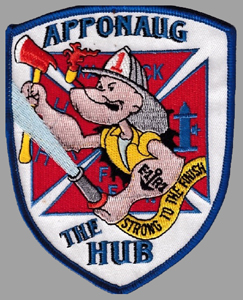Home > Lenten Blog 2024
What’s in a name?
March 21, 2024

Genesis 17:1-8 | John 8:51-59 | Psalm 105:4-11
Forty-eight years ago this week I began recruit training as a firefighter with the Warwick Fire Department. I was so excited. After getting our turn-out gear we began learning how to dress a hydrant, raise ladders, pull hose lines and chop holes in roofs. We learned and practiced the tactics of fighting fires in buildings. It was a small class of four, so we had plenty of opportunity to try out each new skill – over and over again. Our instructors were very knowledgeable and the guys in my class were all enthusiastic. We learned a new vocabulary as the instructors showed us how to use Haligan tools, SCBA and the Jaws of Life. Every day was an adventure, and I loved every minute of it. Throughout the training process we were also introduced to (and immersed in) the history and culture of the fire service in general and the WFD in particular. We used to joke that the motto of the fire service was: “250 years of tradition – unimpeded by progress”. Even with modern technology and training the fire service remains a community that deeply respects its history.
When training was complete, I was sent to my first assignment at Station 1 – “The Hub” – in Apponaug. I was assigned as the back-step man of Engine 1 “B” Platoon. This was a great assignment because Station 1 was busy and the crew on “B” Platoon were mostly young guys who really enjoyed working together. I was a little bit unsure, however, about how I was going to fit in. Many of the guys were Viet Nam veterans, and all were married with families. And they all had multiple years on the job. I was fresh out of college and more than a little naïve and eccentric in my own way.
In joining this well-established community, one of my first jobs was to learn everyone’s name, and as I was introduced to the guys on my crew and the crews in the nearby stations, I learned that many folks had very unique nicknames. There was “Bugs” and “Guppy”, “Seagull”, “Whisper Jet”, “Watermelon Belly” and the incomparable “Rubber Dummy”. All these nicknames had colorful backstories that gave each person a unique identity within the community, and it was a great experience hearing the stories and learning the details of each name.
As the junior man on my platoon, it was my job to do whatever I was told as quickly as possible without complaint. Answer the phone – no more than two rings. Keep the two coffee pots full at all times. Clean the bathroom, wash those dishes in the sink. Make a list and get doughnuts for everybody – and don’t forget the chiefs and secretaries upstairs! I was always busy.
Now in 1976 I was 24 years old, but if the truth be told I looked about 16. And I will admit that my enthusiastic and rather naïve nature made me susceptible to a lot of good-natured ribbing. Within a few months of my arrival, I noticed something. It certainly wasn’t planned by anyone, and it took a while to catch on, but soon I was regularly hearing: “Hey Kid – go gas up the Chief’s car”, or “Hey Kid, bring me a pick-headed axe”. Over the course of several months, I had become the “Kid”. This new name had been mystically conferred on me by the community and it was a sign (to me at least) that I was known and accepted. My relationship with this new family had been established and my new name was the outward and visible sign of that acceptance. I was (and continue to be) so grateful to be embraced and accepted as a member of this unique community. When I see my buddies even today, they still greet me with a hearty “Hey Kid!”.
When themes are repeated in scripture, that is usually a sign that the stories are significant and deserve our attention. There are plenty of stories in the Bible that involve names and name changes. After wrestling with God all night, Jacob is renamed Israel. Jesus calls the disciple Simon, Peter – the rock (Cephas in Aramaic and Petros in Greek). Saul, the zealous Jew described in the book of Acts becomes the Apostle Paul (he was a Roman citizen and Paulus was his Roman name – which was probably more suitable for his outreach to the Gentiles).
In today’s lesson from Genesis, we hear some of the story of Abram. The Lord and Abram have been in conversation for some time. At the Lord’s call, Abram and his wife Sarai have left their home in the land of Ur to settle in Caanan (with a detour to Egypt during a severe drought). Now Abram is ninety-nine years old, and Sarai is ninety, but Abram’s only offspring is Ishmael, the son of Sarai’s slave Hagar. Abram and Sarai have lost hope of ever having any descendants. But the Lord appears to Abram again and reassures him. The Lord establishes a covenant with Abram… his name shall no longer be Abram (exalted father) but Abraham (father of a multitude). Sarai will become Sarah (princess to many) and within a year she will have a son who shall be named Isaac, and a multitude of descendants will live in the land of Canaan and worship the Lord forever more. God’s promise was fulfilled, and we remember Abraham to this day as the patriarch of Judaism, Christianity, and Islam. The name changes reflect the nature of a new relationship between the Lord and His people.
Our names are part of our story and become a symbol of our identity. Each of us is a unique and beloved child of God. Isaiah assures us that each of our names is inscribed on the palm of God’s hand. The celebrant speaks our name as we are washed in the water of Baptism. We are known in community by our name, and I am grateful to be a part of a loving Christian community that welcomes people, recognizes their individuality, and accepts them as they are. Just as I felt embraced and supported by my brother firefighters those many years ago, I hope during our journey together towards Easter, you too will feel recognized, supported, loved and accepted, just the way you are.
Paul “The Kid” Brookes


